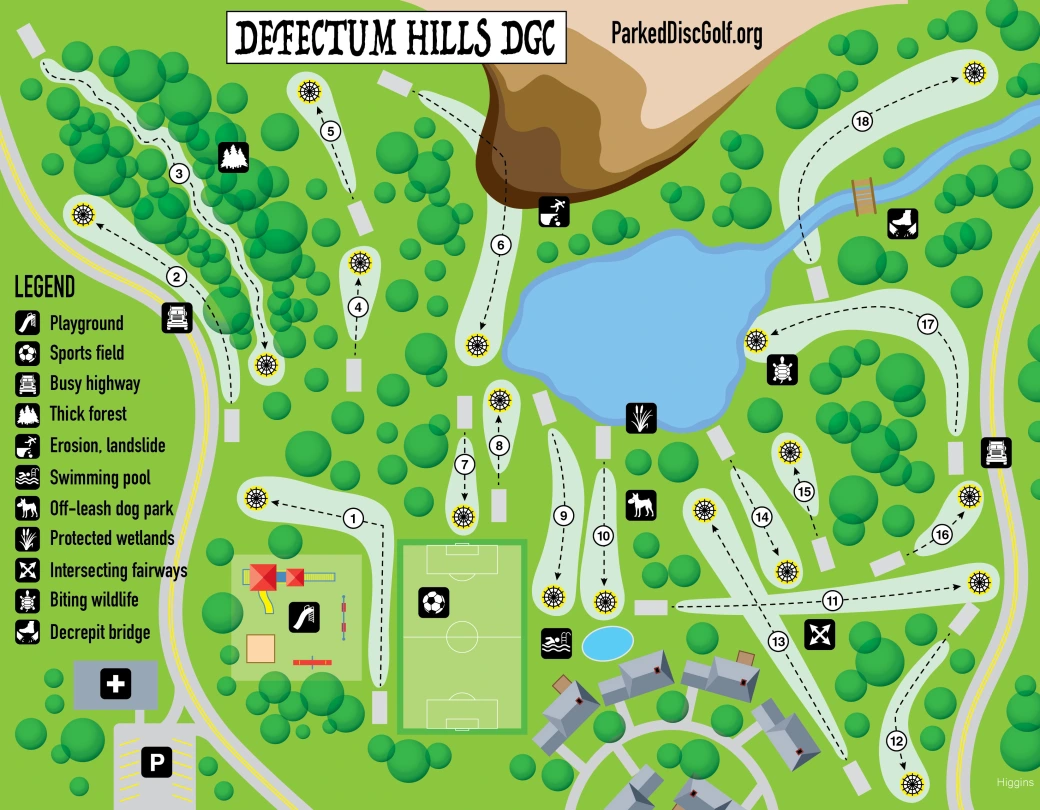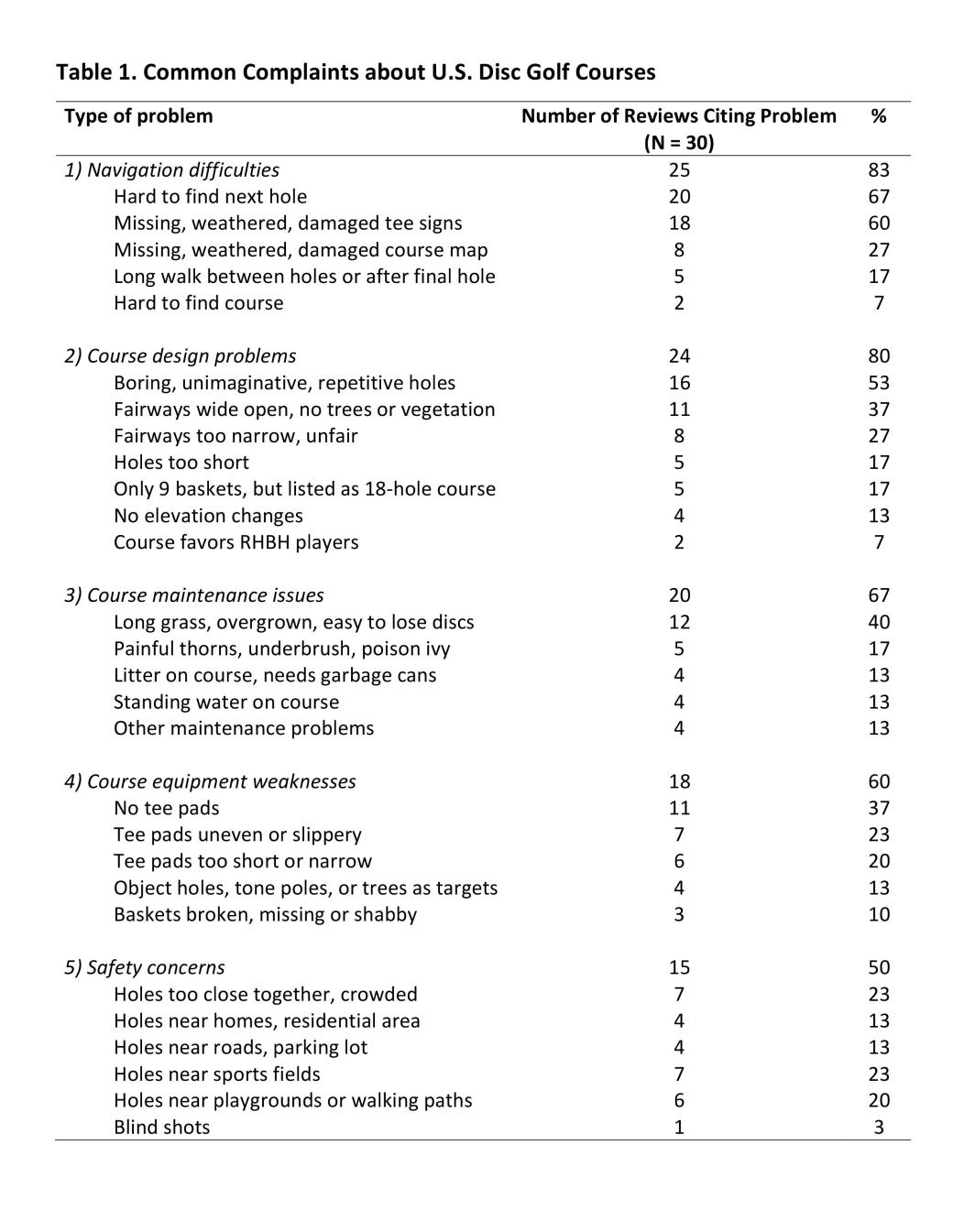A Review of Five Common Gripes on Disc Golf Course Review
By Josh Woods ~

Imagine yourself on disc golf’s death row. You can only throw one last round. Where would you play?
I’ve asked several disc golfers this question, and I’m always a little surprised by the answers. I half-expect people to name a legendary course, one that tops the charts on Disc Golf Course Review, or one located in a far-flung corner of the planet where most drinks are served with tiny umbrellas.
Yet, more times than not, disc golfers name their home courses. When confronted by the fateful dilemma of choosing one last place to play, they choose the place they always play.
At first glance, this seems weird. No one ever responds to the last-meal question by saying, “frozen pizza and a bagged salad.” If we don’t choose everyday fare for our last meal, why choose an everyday course for our last round?
For many disc golfers, the answer comes easy. We love our home courses. For those who help build them, the bond is forged in teamwork and hard labor, in long, hot days digging tee pads, mixing cement, and taking endless trips to Lowes.
There’s nothing wrong with home love. I would argue further that putting corporations in charge of building all new courses would damage the heart of disc golf land and stifle its unique culture.
Lake Wobegon Effect
Still, love has a downside. Strong attachment can lead to detachment from reality. Academics call this “illusory superiority,” a cognitive bias that encourages us to misjudge the objects of our affection.[1]
In other words, like Lake Wobegon, disc golf land may be a place where “all the women are strong, all the men are good looking, and all the disc golf courses are above average.”
One of the goals of Parked has been to counterbalance the Lake Wobegon effect and critically examine disc golf courses in the United States. To this end, in collaboration with 3DISCgolf, we conducted the first major survey of experienced course designers. We asked 156 designers about the most important problems facing U.S. courses. Check out two reports based on these data: One article covers maintenance, facilities and design issues, and the other one examines safety concerns.
For the third article in this series, we turn now to the popular website Disc Golf Course Review (DGCR) for more critical insight.
Method
In April 2018, the DGCR archive contained 3,286 courses with 18 holes or more and at least one written review. Given our interest in popular gripes, we limited our search to courses in the bottom half of the rating scale (courses with ratings of 0–2.5 out of 5.0), which reduced the population to 441 courses.
From this group, we randomly selected 30 courses, and then randomly selected one review of each course. Scanning these 30 reviews, we used an open-coding procedure to compile a list of key concerns (“cons”). We then performed a quantitative content analysis to determine which of the problems were listed by reviewers most frequently.
Results
As shown in Table 1, reviewers cited 28 different “cons,” which fall into five general categories including: 1) Navigation difficulties, 2) course design problems, 3) course maintenance issues, 4) course equipment weaknesses, and 5) safety concerns.[2]
The reviewers in our sample cited navigation difficulties (83 percent) more often than any other type of problem.
Mentioned by 67 percent of the reviewers, “hard to find next hole” topped the list of individual gripes. Other common complaints included “missing, weathered, or damaged tee signs” (60 percent), “boring, unimaginative, or repetitive holes” (53 percent) and “long grass, overgrown” (40 percent).
On the other end of the spectrum, safety concerns were cited by the fewest number of reviewers.

Discussion
Based on the top complaints registered on DGCR, a prototypical course reviewer emerges. Let’s call this reviewer Jordan. Jordan does not like losing a disc in long grass, despises unimaginative courses, relishes long holes, dislikes natural tee pads, thinks that wide-open holes are lame, regards thorns in the tush as regrettable, and believes in a simple truth: playing disc golf is not much fun when you don’t know where you’re going.
Jordan is less concerned about safety and rarely worries about disc golf’s environmental impact.
The Takeaway
Supporting previous research, we found that reviewers on DGCR cited navigation difficulties more than any other complaint. If good problems are easy to solve, this is a good one. Installing decent signs is cheaper and requires less time and commitment than revamping holes, staying on top of maintenance issues, purchasing new baskets, or dealing with safety concerns.
Though often seen as “finishing touches,” helpful signs and maps are keys to making visiting players like Jordan happy.
~~~
Enjoying Parked? Sign up for our free newsletter by entering your email address below. And please like us on Facebook, Twitter or Instagram.
~~~
Parked is underwritten in part by a grant from the Professional Disc Golf Association.

~~~
Notes
[1] Kruger, J., & Dunning, D. (1999). Unskilled and unaware of it: how difficulties in recognizing one’s own incompetence lead to inflated self-assessments. Journal of Personality and Social Psychology, 77(6), 1121.
[2] A sixth category containing a small number of miscellaneous concerns, such as “no bathrooms,” “not enough parking,” “goose droppings everywhere,” were not included in Table 1.

An issue that kinda/sorta applies to this subject is the fact that good park maintenance/design and disc golf design often collide in park-style courses. We recently had a creek in our local park confined to a pipe and the creek bed filled in, which was a very big improvement for the park. However, it took away an OB water hazard on a disc golf hole. The change is universally despised by the disc golf community. That imbalance between what makes a nice public park and what makes challenging disc golf is something a lot of disc golfers do not understand.
LikeLiked by 1 person